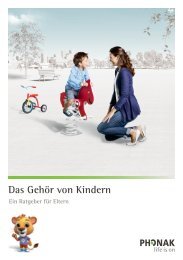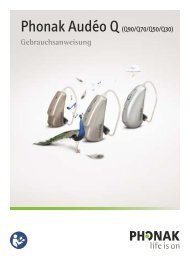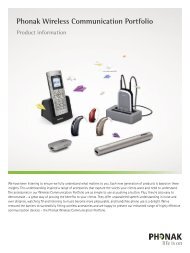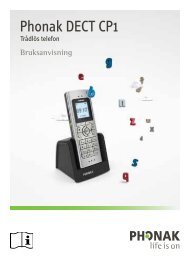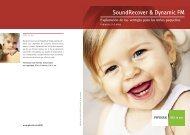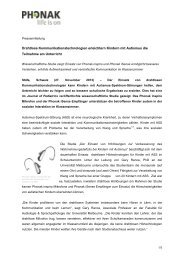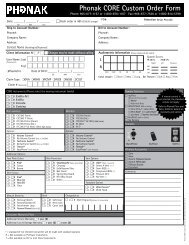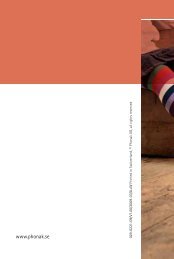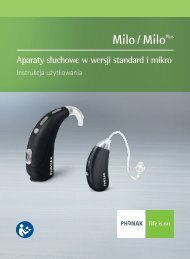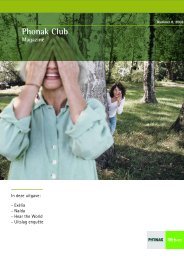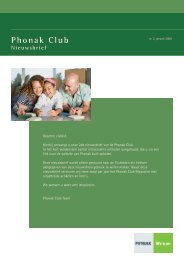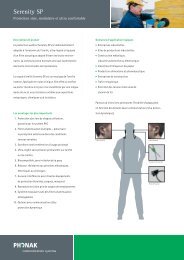gets hearing aids gets hearing aids - Phonak
gets hearing aids gets hearing aids - Phonak
gets hearing aids gets hearing aids - Phonak
Create successful ePaper yourself
Turn your PDF publications into a flip-book with our unique Google optimized e-Paper software.
OLIVER<br />
GETS HEARING AIDS
"Oliver <strong>gets</strong> Hearing Aids" is dedicated to my brother, Patrick, who<br />
is <strong>hearing</strong> impaired, and to the family, friends, and professionals<br />
who were involved in helping him. It was Patrick's <strong>hearing</strong> and<br />
speech professionals that shaped my career as a pediatric audiologist.<br />
This book is written for children. I know from experience the need<br />
for awareness and understanding that must be developed, not only by<br />
children with <strong>hearing</strong> loss, but also by their peers. Additionally,<br />
I hope that this book will reduce anxiety in those children first being<br />
diagnosed with <strong>hearing</strong> loss and fit with <strong>hearing</strong> <strong>aids</strong>.<br />
Maureen Cassidy Riski, M.Ed.<br />
OLIVER<br />
GETS HEARING AIDS<br />
Knowing that education is the key to understanding, I believe that<br />
the publication of this book will promote better understanding of the<br />
challenges and importance of identifying and managing children with<br />
<strong>hearing</strong> impairment. We wrote about "Oliver" to create a resource for<br />
parents, teachers, and children who want to learn about the process<br />
of <strong>hearing</strong> evaluation and habilitation.<br />
Nikolas Klakow, M.S.<br />
The authors would like to thank Dr. Rick Pillsbury, Dr. Amelia Drake,<br />
and the staff of the Department of Otolaryngology, University of North Carolina<br />
for the opportunities and support that they have provided.<br />
Written by:<br />
Maureen Cassidy Riski, Nikolas Klakow<br />
Illustrated by:<br />
Polygone, Nicolas Babey<br />
Copyright © 2001. All rights reserved. No portion of this book may be reproduced, by any process or technique, without the express written consent of <strong>Phonak</strong> AG.
All the children<br />
were playing and having fun,<br />
except Oliver.<br />
Oliver was sad<br />
because he couldn’t quite<br />
understand what his friends<br />
were singing.
In school,<br />
because Oliver<br />
couldn’t hear<br />
his teacher,<br />
he often missed<br />
the directions<br />
she gave.
It was recess!<br />
Oliver tried to play with<br />
the other children, but<br />
he couldn’t always hear<br />
what they were saying<br />
to him. So Oliver would<br />
just be by himself.
Once again, Mrs. Brown,<br />
Oliver’s teacher, had given him<br />
a note to take to his mother.<br />
When Oliver came home,<br />
he gave the note to his mother,<br />
and went to sit in front of<br />
the TV.
Oliver liked<br />
watching TV.<br />
It was one of<br />
the few things<br />
he could make loud<br />
enough for him<br />
to understand.<br />
His brother<br />
and sister<br />
thought the TV<br />
was too loud!
“Who can I see for<br />
help?" Mrs. Elephant<br />
asked Dr. Young,<br />
the family doctor.<br />
“Oliver needs to see<br />
an ear doctor,”<br />
replied Dr. Young.
The next day<br />
Oliver’s parents<br />
picked him up<br />
early from<br />
school, and<br />
they went to<br />
the ear doctor.
The doctor’s waiting<br />
room was full!<br />
There was Tony who<br />
had a sore throat,<br />
and Samantha with<br />
an earache...
“Oliver,” the nurse called.<br />
It was Oliver’s turn to see<br />
the doctor.<br />
“Let’s see what we have here,”<br />
Dr. Dog said, while looking<br />
into Oliver’s ear. Oliver was<br />
very brave, and let the doctor<br />
look into his ear.<br />
“You need to have your <strong>hearing</strong><br />
tested by the audiologist,”<br />
said Dr. Dog.
“Hello,” said the audiologist,<br />
as Oliver walked into the test booth.<br />
“I’m going to test your <strong>hearing</strong>."<br />
“Are you ready to play my<br />
<strong>hearing</strong> game?" This is an easy<br />
game, Oliver thought, as he threw<br />
a block in a bucket each time<br />
he heard a beeping sound.<br />
“Good listening Oliver – look<br />
at all those blocks!"
“Here are the results,”<br />
the audiologist explained<br />
to Oliver’s parents.<br />
“He has a <strong>hearing</strong> loss<br />
in both of his ears.<br />
That is why he has<br />
been having so much<br />
trouble <strong>hearing</strong>.”<br />
“Oliver needs<br />
<strong>hearing</strong> <strong>aids</strong>,<br />
so he will be able<br />
to hear clearly,”<br />
said the audiologist.
“He will need<br />
earmolds to connect<br />
the <strong>hearing</strong> <strong>aids</strong><br />
to his ears.”<br />
SQUIRT...<br />
the cold material<br />
the audiologist put in<br />
his ear was drying<br />
quickly.
A couple of<br />
weeks later<br />
Oliver<br />
returned to<br />
the audiologist’s<br />
office to try<br />
on his new<br />
<strong>hearing</strong> <strong>aids</strong>.<br />
What a big day!<br />
“You don’t need to shout!"<br />
he told his parents when<br />
they asked him if he liked<br />
the <strong>hearing</strong> <strong>aids</strong>.
Oliver was surprised<br />
at the songs coming<br />
from the birds!<br />
And the noisy cars!<br />
There was so much<br />
to hear.
It didn’t take<br />
Oliver long to get<br />
used to his new<br />
<strong>hearing</strong> <strong>aids</strong>.<br />
He liked being<br />
able to hear<br />
better.
Oliver liked<br />
singing the most<br />
and music class<br />
soon became<br />
his favorite.
“Here’s the ball!" shouted<br />
Patrick the Rabbit, as he passed<br />
the ball to Oliver.<br />
“Great shot!" everyone yelled,<br />
as Oliver made a goal.
Oliver was careful<br />
with his <strong>hearing</strong> <strong>aids</strong>.<br />
He learned how<br />
to change the batteries<br />
and at night he put them<br />
in their special case.<br />
He took good care of them<br />
so they would last for<br />
a long, long time.
Oliver was happy that he could hear better.<br />
He lay in bed that night, dreaming.<br />
His next birthday would be the best ever.
Speech and Hearing Checklist<br />
This checklist outlines behaviors which may be expected of a child at various ages. If your child<br />
consistently fails to respond as the checklist suggests, there may be a problem which requires<br />
further evaluation. You should contact your local physician if you feel there is any cause for concern.<br />
3-6 months<br />
Children awaken or quiet to the sound of their<br />
parents' voices. They typically turn their eyes<br />
and their heads in the direction of a sound.<br />
7-10 months<br />
Children turn their heads and their shoulders<br />
toward familiar sounds, even when they cannot<br />
see what is happening. Sounds do not have to<br />
be loud to cause them to respond.<br />
11-15 months<br />
Children show understanding of some words by<br />
appropriate behavior. For example, they point to<br />
or look at familiar objects, on request. They jabber<br />
in response to a voice, are apt to cry when<br />
there is thunder, or may frown when scolded.<br />
1 1/2 years<br />
Some children begin to identify parts of the<br />
body. They should be able to show their eyes or<br />
toes and should be using a few single words.<br />
The words are not complete or pronounced<br />
perfectly but are clearly meaningful.<br />
2 years<br />
Children should be able to follow a few simple<br />
commands without visual cues.<br />
They should be using a variety of everyday<br />
words heard at home. Most 2-year-olds enjoy<br />
being read to and shown simple pictures in a<br />
book and will point them out when asked.<br />
2 1/2 years<br />
Many children say or sing short rhymes or songs<br />
and enjoy listening to music or singing.<br />
If children have good <strong>hearing</strong>, and these events<br />
bring them pleasure, they usually react to the<br />
sound by running to look or telling someone<br />
what they hear.<br />
3 years<br />
Children should be able to understand and use<br />
some simple verbs, prepositions, adjectives, and<br />
pronouns such as go, in, big, and me. They<br />
should be able to locate the source of a sound.<br />
They should be using complete sentences some<br />
of the time.<br />
4 years<br />
Children should be able to give connected<br />
accounts of some recent experiences.<br />
They should be able to carry out a sequence of<br />
two simple directions.<br />
5 years<br />
A child's speech should be intelligible, even<br />
though some sounds may still be mispronounced.<br />
Most children this age can carry on a conversation<br />
if the vocabulary is within their experience.<br />
They should use pronouns correctly.
www.phonak.com<br />
more about <strong>hearing</strong>: www.hear-it.org<br />
028-0284-02/0701/wia Printed in Switzerland ©<strong>Phonak</strong> AG All rights reserved



